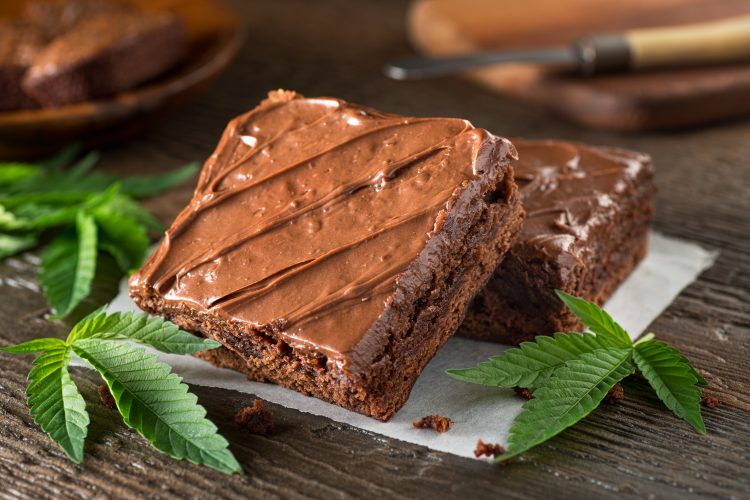Cannabis is everywhere
- Like
- Digg
- Del
- Tumblr
- VKontakte
- Buffer
- Love This
- Odnoklassniki
- Meneame
- Blogger
- Amazon
- Yahoo Mail
- Gmail
- AOL
- Newsvine
- HackerNews
- Evernote
- MySpace
- Mail.ru
- Viadeo
- Line
- Comments
- Yummly
- SMS
- Viber
- Telegram
- Subscribe
- Skype
- Facebook Messenger
- Kakao
- LiveJournal
- Yammer
- Edgar
- Fintel
- Mix
- Instapaper
- Copy Link
Posted: 16 April 2020 | Camille Gourdet | 1 comment
Cannabis expert, Camille Gourdet outlines the different US state regulations of edibles.


If it seems like cannabis is everywhere these days, that’s because it is.
More than two-thirds of the states within the United States have legalised cannabis in one form or another. Although ‘marijuana’ products remain illegal under federal law, as of April 2020, 33 states and the District of Columbia have legalised cannabis for medical purposes, and 11 of those states and the District of Columbia have also legalised cannabis for adult, recreational use.
However, the type of cannabis products a recreational consumer or medical user may encounter varies widely across these states. This is particularly true with respect to the types of cannabis-infused edible products that are available for people to buy, either at a medical or recreational cannabis dispensary.
Variety of cannabis product types
Cannabis edible products can include a wide range of product types, such as cannabis-infused beverages, gummy bears, brownies, cotton candy or mints.
The potency of edibles also varies widely. Most of the states that have legalised cannabis for recreational purposes restrict the amount of THC to five or 10 milligrams per serving. Some states allow for higher amounts of THC for medical users, or for other product types such as concentrates. No states allow the sale of cannabis-infused beverages that also contain alcohol, or vaping products that contain both cannabis and nicotine.
Differences in how states regulate edibles
Each state that has legalised medical or recreational cannabis has made its own decisions about the cultivation, manufacturing, product safety testing, distribution, advertising, packaging, labelling, advertising and taxation of these products.
As a result, there is no standardised serving size, nutrition facts panel, warning label, potency recommendations or testing standards for edible products that are purchased in a medical or recreational dispensary.
Unlike with the recreational sale of alcohol and tobacco products, which is subject to federal manufacturing standards, cannabis products remain illegal under federal law, so they are not governed by any federal product safety standards.
States that have legalised not only determine what types of edible products should be allowed to be lawfully manufactured and sold within the state, but must also license and oversee every aspect of the cannabis product. This oversight includes ensuring compliance with state law throughout the manufacturing process, from the growth of cannabis plants, to the manufacturing of edibles, testing of these products and restrictions on where these products can be sold or distributed.
For example, if you were to line up a cannabis-infused brownie product from dispensaries in the different states that have legalised recreational cannabis and allow stores to sell edibles to consumers, the packaging and labelling would look very different across all products.
Appeal and risks of edibles
Cannabis edible products are a popular choice among recreational users in many of the states that have legalised recreational cannabis. Some consumers may be more inclined to experiment with cannabis edibles, which unlike cannabis products that are smoked or vaped, do not leave smoke or aerosolised products into the air.
A consumer can consume edibles more discreetly and without any concern about the health risks that come with inhaling cannabis. For this reason, edibles may be a more ideal choice than a joint or a vape pen for medical users who are seeking relief from pain or discomfort.
However, these same attributes that may make edibles an appealing choice for recreational or medical consumers may, worryingly, also make these products attractive to children or minors. To help address this, states have implemented a series of packaging and labelling laws to mitigate accidental or intentional consumption by young children, minors or unsuspecting adults.
States’ policy responses to promote safer edible products
Packaging and labelling laws
To address the concerns about the accidental consumption of edibles, most states have put into place various packaging and labelling laws that now require edible products designated for recreational use to be child-resistant. This is intended to prevent young children from being able to physically open an edible product and accidentally consume it.
Certain states specify that the product must be child-resistant upon the package’s initial opening and re-sealing. To prevent accidental consumption by older children and adults, states have mandated the inclusion of specific information on the product’s package or label to indicate that this is a cannabis-infused product.
It is prohibited in many states to package edibles in bright colors that may appeal to children, or which may resemble popular cartoon characters or other youth-appealing symbols or products. Some states have, for example, created a universal symbol that must be affixed to the package of every edible product to visually convey that edible products are not ‘typical’ pantry items.
Labelling laws provide additional textual information and guidance about the product itself to inform a consumer’s ability to consume responsibly. Many states now require the edible product label to list information including: the number of servings and amount of THC per serving contained inside; a statement about the potential delayed effects of intoxication and the warning to not drive within a few hours after consumption; and nutritional information such as the amount of fat, sugar, sodium and potential allergens.
Manufacturing restrictions
Other states have restricted the manufacturing of specific product types. For example, many states require an edible product package with multiple servings to physically demarcate the size and shape of a single, individual serving, so that a consumer can easily see how large or small an individual bite is of a cannabis-infused brownie or other edible product.
All the states that have legalised recreational cannabis and allow recreational products to be sold at a dispensary limit the maximum amount of the intoxicating THC ingredient that may be present per serving size.
Some of the earliest states to legalise recreational use swiftly amended their laws shortly after legalisation to prohibit the manufacturing or sale of cannabis-infused candy, such as cotton candy or lollipops or items that require refrigeration. Some states now allow the sale of cannabis-infused beverages, but require a single serving size to be shown in a way that can be easily understood by a consumer.
This includes only allowing cannabis-infused beverages to be sold in single serving bottles (Massachusetts), sold with a ‘measuring cap or dropper’ that is included with a beverage containing more than one serving (Rhode Island), or sold with a ‘single mechanism’ that can precisely measure a single serving of the beverage (Colorado).
Testing laws
Everything from the cultivation of the cannabis plant, to the retail sale of an edible product must be conducted within a state. This includes product safety testing to ensure that edible products are not contaminated with mould, heavy metals, harmful pesticides or other ingredients that may sicken, poison or seriously harm a consumer.
States even must license laboratories to test edible products before they are available for sale. However, states’ laws vary in terms of which contaminants must be tested for, what happens if a sample fails the testing criteria, the required credentials of staff performing or overseeing the testing, and how test results are tracked and reported to the state.
Many states have adopted a track-and-trace system that enables a designated state agency to take action and trace the source of contamination if a product recall is warranted.
Regulation state-by-state
Edible products require specific laws to prevent accidental consumption or harmful overconsumption. The continued status of marijuana as an illegal controlled substance that remains illegal to cultivate, manufacture, sell, distribute, possess or consume under federal law has led to a lack of national standardisation for the manufacturing, packaging, labelling, advertising or distribution of edible products.
The states that have legalised recreational or medical cannabis products have created their own set of requirements and restrictions that govern whether and how edible products may be sold. We need more research to fully understand the effects and unintended consequences of cannabis-infused edible products. But for now, states are regulating for their own customers.
About the author
Camille Gourdet is a Public Health Analyst at RTI International, a global research institute. She has nearly a decade of experience in evaluating tobacco and cannabis policies at the state level to help measure their impact on public health outcomes. Camille has also done extensive primary legal and policy research of relevant and existing policies related to medicinal and recreational marijuana and tobacco control.
Related topics
Beverages, CBD hemp & cannabis, Food Safety, Ingredients, Packaging & Labelling, Quality analysis & quality control (QA/QC), recalls, Regulation & Legislation, The consumer, Traceability










Very much appreciated. Thank you for this excellent article. Keep posting!